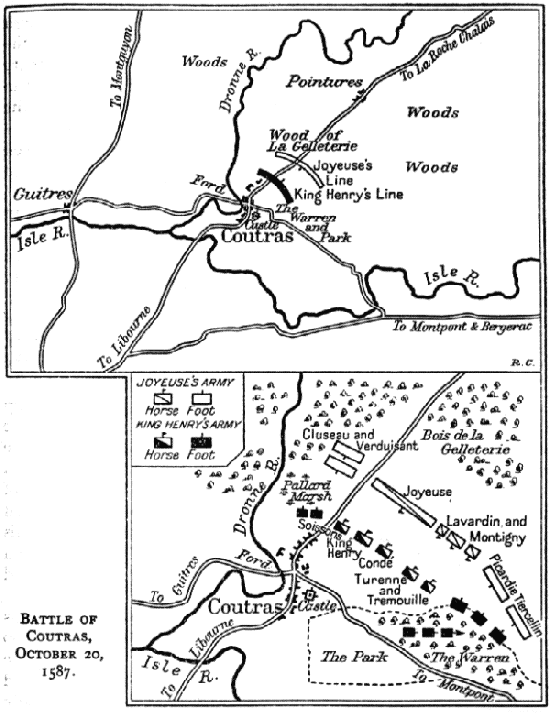

The following quotes are taken from Julien Coudy's Huguenot Wars (Philadephia, NY, London: Chilton, 1969), an enjoyable collection of first-person accounts of the events of this time.
To the Prince de Condé and Count de Soissons:
You see, my cousins, it is to our family that everyone turns. It would not be reasonable for this fine dancer [Joyeuse] and the darlings of the court to chop off the three principal heads that God has guarded in order to protect the others and the state. This quarrel is the same for us all; the outcome of this day will bring down on us more envy than maliciousness; we will share mutually in its honor.
To the officers and soldiers:
My friends, here are spoils quite different from the booty you have taken in the past: a newly married man who still has money in his coffer [Joyeuse], and the elite among the courtiers along with him. Courage! There is none so lowly among you that henceforth he shall not be mounted on a fine charger and served on silver dishes. Who indeed could not be hopeful of victory on seeing you so heartened? They are ours; I swear to it as I see your eagerness to fight. Nevertheless, we must all believe that the outcome is in the hands of God, Who, knowing and favoring the righteousness of our cause, will allow us to see at our feet those who should hold us in honor rather than battling against us. Let us therefore pray to Him for help. This will be the finest deed we will ever accomplish -- the glory belongs to God, the service to the king, our sovereign; the honor shall be ours, and we will bring salvation to the state.
After the king of Navarre had prayers said everywhere, certain persons [Aubigne himself] had them all chant Psalm 118: "the blessed day has come..." Several Catholics under the white standard shouted out loud enough to be heard, "S'death, they are trembling, the cowards; they are confessing their sins!" Vaux, a lietuenant of Bellegarde, who had rubbed elbows with our men more often than had the courtiers, and had joined only in the final fight, said to the duke [Joyeuse], "Monsieur, when the Huguenots go on like that, they are ready to put up a stiff fight."
Joyeuse, who probably was not familiar enough with the terrain or else was carried away by his ardor, had given the order to post his artillery in a place so low that he came to see it would be useless, and had to make a change. This gave us a space of time which we employed in placing our own. It should be said that, no matter what this general did, he got almost no use from his artillery, and this was undoubtedly one of the main reasons that he lost the battle. It shows that nothing is more necessary to the general of an army than a correct first estimate, to shorten his lines and avoid confusion. I have never known any general who did this as well as the king of Navarre.
The battle was already joined when our artillery, which nevertheless consisted of only three pieces of cannon, was in place, and it was time for us to make use of it. The troops in Monsieur de Turenne's sector and in that of La Trimouille had been repulsed on the first encounter, and this began to throw the rest of the army into disorder. The Catholics proclaimed victory, and it would have taken very little to make them victorious in fact, had not our artillery at the same moment bgeun so terrible a cannonade that each shot mowed down a dozen, fifteen, and sometimes as many as twenty-five men. This halted the first onslaught of the enemy, and so belayed them that they withdrew to seek cover, so that only a disunited and badly supported corps opposed the advance of the king of Navarre, the Prince de Condé, and the Count de Soissons, who had rushed forward to lead their three squadrons. These three princes accomplished miracles of valor. They repulsed all those who opposed them and rode down the enemy. Although their armor was badly dented, in an instant everything changed, and the death of the Catholic general gave complete victory to the Protestants at the end.
As soon as I saw the enemy in flight, I abandoned the cannon as useless and had my horse, which Bois-Breuil was holding behind the artillery, brought up to me, then rushed off to get news of my brothers. I had the consolation of learning that neither of the two had fallen in the battle. I met the king of Navarre, busy with dispersing the fugitives and seeing his victory to completion, for he could not feel secure until he no longer saw anyone moving against him. The bodies of Joyeuse and his brother Saint-Sauveur were taken from a pile of corpses and carried to a hall of the chateau at Coutras, where they remained on a table, covered only by a miserable shroud which was thrown over them.